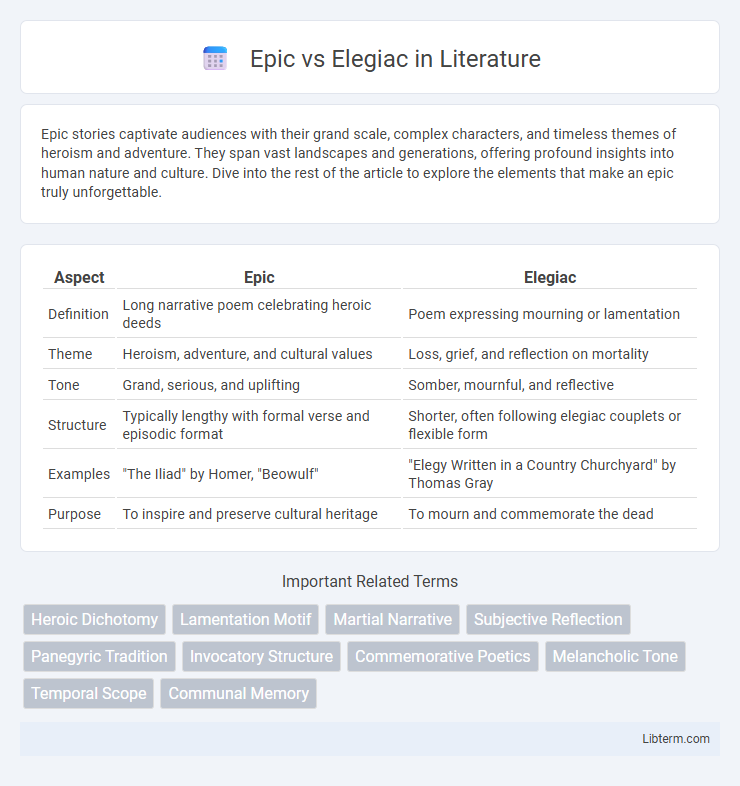Epic stories captivate audiences with their grand scale, complex characters, and timeless themes of heroism and adventure. They span vast landscapes and generations, offering profound insights into human nature and culture. Dive into the rest of the article to explore the elements that make an epic truly unforgettable.
Table of Comparison
| Aspect | Epic | Elegiac |
|---|---|---|
| Definition | Long narrative poem celebrating heroic deeds | Poem expressing mourning or lamentation |
| Theme | Heroism, adventure, and cultural values | Loss, grief, and reflection on mortality |
| Tone | Grand, serious, and uplifting | Somber, mournful, and reflective |
| Structure | Typically lengthy with formal verse and episodic format | Shorter, often following elegiac couplets or flexible form |
| Examples | "The Iliad" by Homer, "Beowulf" | "Elegy Written in a Country Churchyard" by Thomas Gray |
| Purpose | To inspire and preserve cultural heritage | To mourn and commemorate the dead |
Defining Epic and Elegiac: Key Differences
Epic poetry features grand narratives centered on heroic deeds and mythic events, characterized by extensive length, formal style, and elevated language. Elegiac poetry, conversely, emphasizes themes of mourning, loss, and reflection, often expressed in concise, sorrowful couplets. The key difference lies in epic's celebratory tone and expansive storytelling versus elegiac's personal, somber mood and brevity.
Historical Origins of Epic and Elegiac Poetry
Epic poetry originated in ancient Mesopotamia and Greece, with seminal works like the "Epic of Gilgamesh" and Homer's "Iliad" embodying heroic narratives and cultural myths. Elegiac poetry, emerging from classical Greece and later Rome, developed as a personal and reflective form, often composed in elegiac couplets to express mourning or love. Both genres hold distinct historical significance, with epics preserving collective identity and elegies exploring individual emotion.
Structural Elements of Epic Narratives
Epic narratives are characterized by a grand scale structure that includes a vast setting, a central heroic figure, and formal invocation to a muse, often structured around a significant journey or quest. Elegiac poetry, in contrast, employs a more intimate and personal structure, typically consisting of couplets that express themes of loss, mourning, or reflection rather than heroic exploits. The structural elements of epic narratives emphasize extended action, detailed genealogies, and epic catalogues that establish the hero's cultural significance and the story's historical scope.
The Tone and Mood in Elegiac Works
Elegiac works convey a tone of mournful reflection and sorrow, often marked by a somber mood that resonates with loss and lamentation. The language typically evokes deep emotions through subdued imagery and melancholic themes, contrasting with the grandiose and heroic tone found in epic poetry. This reflective and sorrowful atmosphere in elegiac poetry invites readers to contemplate mortality and the passage of time.
Major Themes in Epic Literature
Epic literature often explores grand themes such as heroism, the struggle between good and evil, and the fate of nations, emphasizing the protagonist's journey and their impact on history or divine order. Elegiac poetry, by contrast, centers on themes of loss, mourning, and the fleeting nature of life, reflecting personal sorrow and the inevitability of death. Both genres engage deeply with human experience, but epics celebrate enduring legacy while elegies meditate on transience and remembrance.
Motifs of Loss and Mourning in Elegiac Form
The elegiac form prominently features motifs of loss and mourning, capturing personal grief and collective sorrow through reflective and somber tones. Unlike epic poetry, which celebrates heroic deeds and grand narratives, elegies emphasize themes of impermanence, memory, and lamentation, often responding to death or separation. This focus on emotional depth and personal vulnerability distinguishes the elegiac tradition within classical and contemporary literature.
Notable Examples of Epic Poetry
Notable examples of epic poetry include Homer's "Iliad" and "Odyssey," which vividly narrate heroic adventures and legendary battles from ancient Greece. Virgil's "Aeneid" stands as a cornerstone of Roman epic tradition, blending myth and history to depict the founding of Rome. These epics emphasize grand themes of heroism and destiny, contrasting with the more personal and mournful tone found in elegiac poetry.
Influential Elegiac Poets and Works
Influential elegiac poets such as John Milton, Thomas Gray, and W.H. Auden have profoundly shaped the tradition through seminal works like "Lycidas," "Elegy Written in a Country Churchyard," and "In Memory of W.B. Yeats," which explore themes of loss, mourning, and reflection. These elegies often employ a reflective and somber tone, distinguishing them from the grand, heroic narratives characteristic of epic poetry. The elegiac form remains central to literary expressions of grief and commemoration, emphasizing personal and collective memory.
The Role of the Hero: Epic vs Elegiac Perspectives
Epic poetry elevates the hero as a powerful, larger-than-life figure who embodies cultural ideals and drives grand, world-altering narratives. In elegiac poetry, the hero is often portrayed as a more vulnerable, reflective individual grappling with personal loss, mortality, and the passage of time. This contrast highlights the epic's focus on heroic glory and communal identity versus the elegiac's exploration of human fragility and introspection.
Lasting Influence on Modern Literature
Epic poetry, exemplified by works like Homer's *Iliad* and *Odyssey*, established foundational storytelling techniques that shaped narrative structures and themes in modern literature. Elegiac poetry, rooted in personal reflection and mourning as seen in Ovid's *Metamorphoses* elegies, influenced the development of lyrical expression and emotional depth in contemporary poetry. Both genres have left a lasting imprint by enriching narrative scope and emotional resonance in literary traditions worldwide.
Epic Infographic

 libterm.com
libterm.com